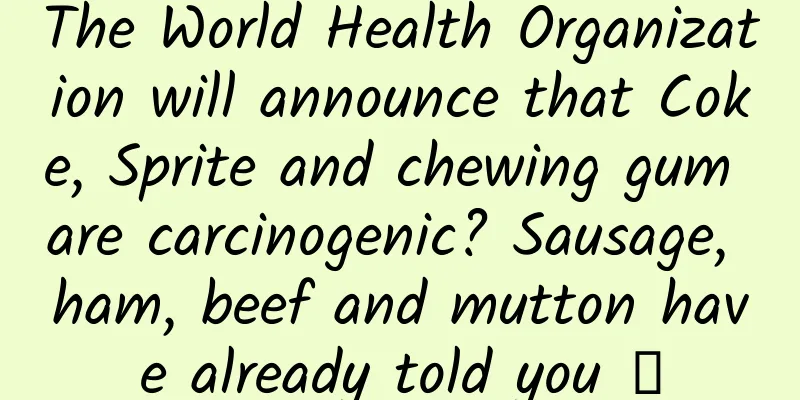The World Health Organization will announce that Coke, Sprite and chewing gum are carcinogenic? Sausage, ham, beef and mutton have already told you →

|
On June 29, the topic #AspartameCausesCarcinoma# topped the trending search list, causing a stir in the beverage industry and among netizens. Some brands came out to clarify overnight... Reuters reported on June 29 that aspartame, one of the world's most common artificial sweeteners, will be listed as a Class 2B carcinogen (i.e. "substances that may be carcinogenic to humans") for the first time in July this year by the International Agency for Research on Cancer (IARC), the cancer research agency of the World Health Organization (WHO). Aspartame is used in products such as diet sodas such as cola, some chewing gums and some beverages. The report also said that the above conclusion was made after IARC convened a meeting of external experts in early June. The meeting mainly evaluated which substances are harmful to the human body based on all published research evidence. The Joint FAO/WHO Expert Committee on Food Additives (JECFA) is also reviewing the use of aspartame and will announce the results of the investigation in July. Who is IARC? Why does a piece of news make the industry so nervous? IARC is an agency under the World Health Organization. According to its official website, the agency is interdisciplinary and brings together the capabilities of epidemiology, laboratory science and biostatistics to identify the causes of cancer so that preventive measures can be taken to reduce the disease burden and related suffering. IARC's information itself is not mandatory, but its opinions may indirectly affect the decision-making of regulatory authorities, and therefore have also attracted industry attention. The meat industry has previously been influenced by IARC's opinions. On October 26, 2015, IARC released a report that listed processed meat products such as sausages, ham, and bacon as "Class 1 carcinogens" and red meat such as fresh beef and mutton as "suspected carcinogens Class 2A" (see below for carcinogenicity levels). At that time, affected by this news, the stock prices of listed companies related to pig slaughtering and meat products fell to varying degrees. What is aspartame? Which beverages contain it? Aspartame is an artificial high-intensity sweetener, which is 200 times sweeter than sucrose. When achieving the same sweetness, using sweeteners such as aspartame can save costs. A reporter once sorted out 41 beverages involving the concepts of "sugar-free" and "low-sugar" through offline supermarkets and e-commerce platforms, covering common carbonated drinks, sparkling water, tea drinks and other drinks on the market. Most beverages that claim to be "sugar-free" or "low-sugar" do not actually use aspartame. Only some products are labeled with aspartame, including Coca-Cola Zero, Coca-Cola Fiber+, Sprite Fiber+, Fanta Zero, Pepsi Zero, and Pepsi Diet. In addition, Mars Extra chewing gum and some Snapple drinks also use sweeteners such as aspartame. In addition to the above-mentioned beverages, other foods also use aspartame as a sweetener, such as Wrigley's sugar-free chewing gum. How to understand “substances that may be carcinogenic to humans”? IARC divides chemicals that have been studied for carcinogenicity into four categories: Class I carcinogens : have clear carcinogenic effects on humans, which have been confirmed by animal experiments and population epidemiological surveys. Class I carcinogens include aflatoxin, nitrosamines, dioxins, nicotine, benzopyrene, etc. Nitrites (-NO2) such as sodium nitrite, organic substances containing "azo groups (N=N)", etc. can also be considered as first-class carcinogens. Common sources of Class I carcinogens: Aflatoxin: It is most commonly found in rotten peanuts, peanut oil, corn, rice, and cotton seeds. Nitrosamines: from rotten grains, vegetables, fish, meat, eggs and milk Dioxins: from tar, asphalt (so don't go on newly paved roads), burning plastics (huge harm) Benzopyrene: from cigarette smoke, car exhaust, smoking, high-temperature cooking of food, etc. (When the cooking oil temperature exceeds 270°C, benzopyrene will be produced. Barbecue can also produce benzopyrene, especially barbecued fat, chicken skin, lamb chops and other foods with high fat content. Pay special attention to the burnt part, which is the gathering place of benzopyrene. Its content can be as high as 10 to 20 times that of ordinary food.) Tobacco, alcoholic beverages, aflatoxin, betel nut, Chinese salted fish, etc. are clearly carcinogenic. People may think that smoking and drinking are not a big deal, but over time they may become the "culprit" of cancer. Aflatoxin is mainly found in moldy nuts, rice, and corn. When eating these foods, you must pay attention to washing and storing them properly. Category II carcinogens : divided into 2A and 2B according to their potential. Class 2A carcinogens are likely to cause cancer in humans, that is, they are confirmed carcinogens in animals, but there is limited evidence of their carcinogenicity in humans, such as acrylamide, inorganic lead compounds, chloramphenicol, etc. (If you often use high-temperature frying and high-temperature cooking fumes to cook food in your life, you are more likely to be exposed to acrylamide, so you should try to avoid it.) Class 2B carcinogens are potentially carcinogenic, meaning there is insufficient evidence of their carcinogenicity to humans and animals, such as chloroform, dichlorvos, naphthalene sanitary balls, nickel metal, nitrobenzene, diesel fuel, gasoline, etc. (If the above foreign media reports are true, then aspartame belongs to this category - "Class 2B" carcinogen.) Category III carcinogens : their carcinogenicity to humans cannot be classified, that is, they are suspected of being carcinogenic. These include Sudan red pigment, cholesterol, caffeine, melamine, saccharin and other carcinogens that cannot be classified. There is insufficient evidence of carcinogenicity in animal and human studies for these substances, or there is sufficient evidence in animal experiments, but human studies have clearly shown that they have no carcinogenic effect. Of course, this does not mean that these foods can be eaten without worry regardless of the quantity, because although they are not carcinogenic, they can bring other health risks. Category 4 carcinogens : may not cause cancer to humans. Aspartame’s health controversy has been going on for a long time. Can we still drink related beverages? "It's still quite unexpected (that aspartame may cause cancer)." Gu Zhongyi, director of the Beijing Nutritionist Association and a master of public health at Tsinghua University, said that aspartame has always been controversial. Decades ago, there were some controversies about neurotoxicity. In 2005, an animal experiment suggested that very high doses of aspartame may cause lymphoma and leukemia in rats, but the authority has not determined that it is carcinogenic after verifying the evidence. "So I personally don't worry about it causing cancer." Gu Zhongyi believes that even if an authoritative organization eventually officially announces that aspartame is a possible carcinogen, it does not mean that this sweetener cannot be used normally. "This is different from toxicity in the general sense." In addition, there are many alternative sweeteners available, and aspartame is 200 times sweeter than sucrose. Many large companies do not use much aspartame in their products, and the daily dose is still relatively small. It is worth noting that the insider cited in the Reuters report did not disclose the magnitude of aspartame's carcinogenicity determined by IARC, that is, how many doses a normal person needs to take to have a risk of cancer. Another nutrition practitioner also said that even if aspartame is eventually announced to be carcinogenic, it is very likely that it will not have much impact on the eating habits of ordinary people. Many foods or ingredients have had clearer carcinogenic risks before, such as betel nut and oral cancer, alcohol and liver cancer, but people have not completely stayed away from betel nut or alcohol, and related industries have always existed and developed. Compiled by Zhang Hongwei, New Media Editor (This article is compiled from Jiemian News, Guangming Online, China News Network, Shangguan News, BTV I am a Great Doctor, Science Popularization China, etc.) |
>>: Can eating Tremella supplement collagen? The real function of Tremella is...
Recommend
Ovarian function hormone a
Excessive estrogen metabolism will immediately ca...
How to solve the abnormal fetal position at 27 weeks
When a woman goes to the hospital for a physical ...
What to do if you have bleeding during intercourse after wearing an IUD
Inserting an IUD is a method chosen by many women...
What to do if there are polyps in the endometrium
Women's physical examinations will include gy...
Discharge from nipple during pregnancy
When a pregnant mother thinks about her pregnancy...
What are the dangers of vaginal bleeding
Vaginal bleeding. Generally speaking, when a woma...
Pain in the middle of a woman's lower abdomen
Everyone should always pay attention to their phy...
Why can some yogurt be stored for half a year, while others can only be stored for a few days?
When you go to the supermarket to buy yogurt, do ...
Why did the "butt injection" that was popular when we were young disappear?
Hello, this is Science Popularization China. When...
Female lower body odor
In life, many female friends are often troubled b...
Can I drink lotus leaf tea during menstruation?
He leaf tea is very popular as a tea with good we...
Are Minting contraceptive pills harmful?
Taking birth control pills is also a contraceptiv...
Stomach ache
Menstruation is a physiological cycle that occurs...
Can endometriosis heal on its own?
Endometriosis is one of the common gynecological ...
Why is the pizza crust hard when baked? How to bake the pizza crust so that it is not hard
"Pizza" is an Italian-style food made w...









